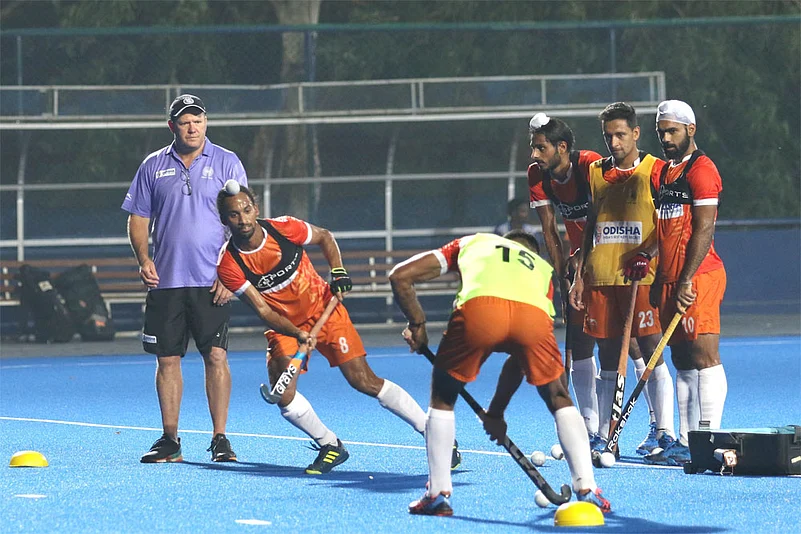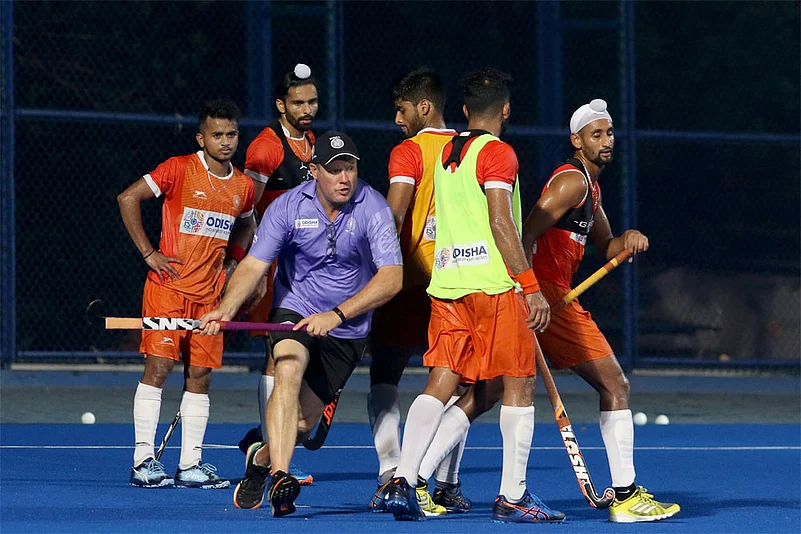Just a couple of weeks from completing a year as the head coach of the Indian national men’s hockey team, Queenslander Graham Reid never expected that his plans for the now postponed 2020 Tokyo Olympics could be scuppered by a virus among all things. Fifty-five-year-old Reid, who played as a defender and mid-fielder for Australia in two Olympics, one World Cup and nine Champions Trophies, had to cancel a week’s holiday to Perth due to the coronavirus. Reid and wife Julia continue to be in ‘quarantine’ at the Sports Authority of India’s Bangalore campus along with the entire men’s squad and support staff, which includes another Australian World Cup winner and Olympian, Chris Ciriello. Reid spoke to Outlook on the unprecedented times in world sport. Excerpts
You were stopped at the main gate by security guards because the SAI Bangalore management decided to seal off the campus due to the coronavirus scare. Were you taken unawares?
(Laughs) Yes, indeed but that was resolved. Given how deadly this virus can be, I think we are lucky to be isolated at the SAI campus. It’s been almost two weeks of lockdown and I think the steps taken have been very good. As far as our training is concerned, it’s going to be an extended one but it’s all good here.
Players must be feeling homesick. Is boredom impacting training?
On the contrary, there are no distractions now and that’s ideal when you are getting ready for the Olympics. In today’s world of social media, you are never far away from your loved ones and the lads haven’t complained. Our training sessions have been as intense as ever.
You must be feeling homesick?
A: I have a 21-year-old son (Scott) studying law and economics at the University of Amsterdam and a physiotherapist daughter (Emma) living in Perth. Both are trying to find ways to combat the current situation. Social distancing is imperative now. Thankfully, we cancelled a short trip to Perth. We could have got stranded in Australia. As parents, you want to see your children but these are difficult times...
How are you making the training sessions interesting in this lockdown period?
A: Ahead of the 2014 World Cup, Australia had very little international tournaments to prepare. Ric Charlesworth, our coach, made our internal matches as competitive as they could be. We took them extremely seriously and we had only one practice match before the World Cup. After winning the title in The Hague, we found out that our internal matches had 40 per cent more impact than the real World Cup games. Sometimes we don’t understand how competing among ourselves can make a difference. It’s the same strategy here in Bangalore. We have 32 extremely talented lads and these internal matches since January have helped tremendously.

Courtesy: The Hockey India
You have had some positive results this year in the FIH Pro League. You beat The Netherlands, Belgium and ran Australia close.
A: I keep going back to 2014 and the impact of internal matches. We have been training harder than ever before since January and the results against the three best teams in the world lift the trust factor and the belief that we have been on the right track. We can only push harder now and this quarantine will help.
Q: Countries like The Netherlands and Australia are unable to train like India.
A: Yes, in India we are in a lucky position. The Dutch can’t train now. So thus Belgium or Germany or England. Even Australians are unable to train as a team. So, this lockdown has been a blessing in disguise.
In London, India finished 12th and last. In Rio 2016, India were eighth. Given our current form, what are your expectations? Are you under pressure?
A: Pressure, we can’t control but we can control our performance. We have a very good team and a young group that is coach-able and willing to learn. If this team plays its best, it can be a real dangerous side. To be able to play your best when the Olympics come along will be the biggest challenge.
Earlier, foreign coaches complained communication with players was a big issue. How have you addressed this?
A: Before I came to India, I was worried about this communication issue. But now it’s much better. For the last six-seven months my wife (Julia) and Chris Ciriello (analytical coach) have been taking English lessons once a week. They have been doing mock interviews with the boys. The senior group has no communication problem. And our assistant coaches Shivendra Singh and Piyush Dubey have helped too.
It’s going to be a year for you as India coach. You have a 76 per cent win-loss ratio so far. That’s quite incredible.
A: When I applied for the India job, I never wanted to be a fly-in and fly-out coach. I actually wanted to learn the Indian culture and travel a bit. Recently, we went to the Bandipur Tiger Reserve and National Park and it was great fun. Every Indian player is a story and that makes my job incredibly interesting.
















